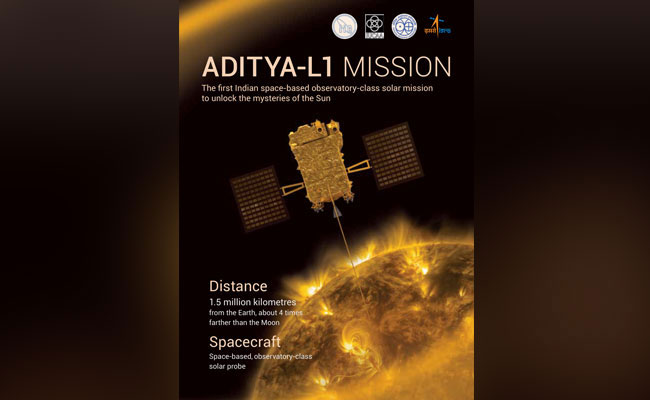Bengaluru (PTI): India's Aditya-L1 solar mission spacecraft has commenced collecting scientific data to help scientists analyse particles surrounding Earth, ISRO said on Monday.
The sensors on board India's first solar observatory have begun measuring ions and electrons at distances greater than 50,000 km from Earth, ISRO announced in a post on X.
The national space agency said that the sensors on STEPS or the Supra Thermal & Energetic Particle Spectrometer instrument began measuring supra-thermal and energetic ions and electrons at distances greater than 50,000 km from Earth.
The instrument is a part of the Aditya Solar Wind Particle EXperiment (ASPEX) payload of Aditya L1.
STEPS comprises six sensors, each observing in different directions and measuring supra-thermal and energetic ions ranging from 20 keV/nucleon to 5 MeV/nucleon, in addition to electrons exceeding 1 MeV. These measurements are conducted using low and high-energy particle spectrometers.
The data collected during Earth's orbits helps scientists to analyse the behaviour of particles surrounding the Earth, especially in the presence of its magnetic field.
STEPS was activated on September 10 at a distance greater than 50,000 km from Earth. This distance is equivalent to more than eight times the Earth's radius, placing it well beyond Earth's radiation belt region.
After completing the necessary instrument health checks, data collection continued until the spacecraft had moved farther than 50,000 km from Earth.
These STEPS measurements will persist during the cruise phase of the Aditya-L1 mission as it progresses toward the Sun-Earth L1 point. They will continue once the spacecraft is positioned in its intended orbit.
Data collected around L1 would provide insights into the origin, acceleration, and anisotropy of solar wind and space weather phenomena.
STEPS was developed by the Physical Research Laboratory with support from the Space Application Centre in Ahmedabad.
Aditya-L1 was launched by ISRO on September 2.
The spacecraft carries seven different payloads to study the Sun, four of which will observe the light from the Sun and the remaining three will measure in situ parameters of the plasma and magnetic fields.
Aditya-L1 will be placed in a halo orbit around the Lagrangian Point 1 (L1), which is 1.5 million km from the Earth in the direction of the Sun. It will revolve around the Sun with the same relative position and hence can see the Sun continuously.
Let the Truth be known. If you read VB and like VB, please be a VB Supporter and Help us deliver the Truth to one and all.
Kalaburagi: Four men have been arrested in Kalaburagi on charge of hacking a man with lethal weapons and pelting stones at him under the limits of Station Bazaar Police Station recently.
According to police sources, Anand Jalak Shinde (34), Ashitosh Jalak Shinde (30), Imran Mehboob Sheikh (28) and Sohaib Anwar Qureshi have been arrested. The men are accused of the brutal murder of Syed Mehboob, a resident of Station Bazaar Upper Line Hamalawadi in the city.
An FIR was filed by the Station Bazaar Police Station based on a complaint given by Syed Ismail, father of the deceased Syed Mehboob.
Following quick probe, the police team successfully arrested the suspects within 24 hours. The arrested men were produced in court and have been sent to judicial custody.
The City Police Commissionerate has appreciated in an official release the police team’s quick solving of the murder case and arrest of the four men accused of murdering Syed Mehboob.





